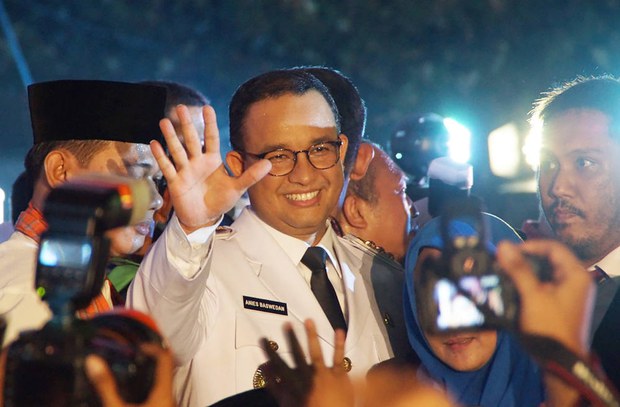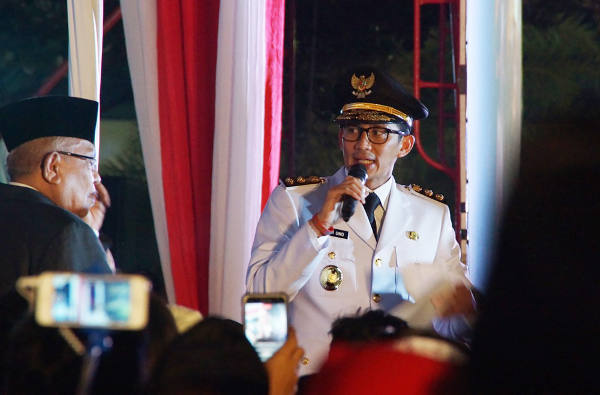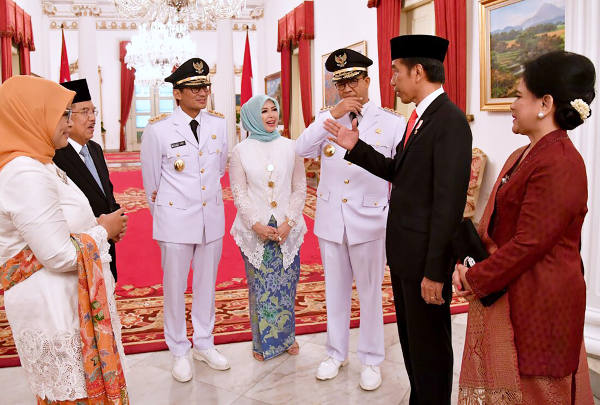‘Natives’ Oppressed by ‘Colonialism,’ New Jakarta Governor Says
2017.10.16
Jakarta
 Jakarta Gov. Anies Rasyid Baswedan waves after arriving in City Hall after his swearing in, Oct. 16, 2017.
Jakarta Gov. Anies Rasyid Baswedan waves after arriving in City Hall after his swearing in, Oct. 16, 2017.
In his inaugural speech Monday, new Jakarta Gov. Anies Rasyid Baswedan said it was time for “native” Indonesians to throw off “colonialism” in their own country.
The remarks seemed to evoke the economic and religious tensions that helped elect him, after a bruising election season in which the ethnic-Chinese, Christian incumbent was not only unseated but sent to jail for two years on charges of blasphemy against Islam.
“For people of Jakarta, colonialism is in full view,” Anies said to applause from about 1,000 supporters at Jakarta City Hall late Monday.
“All of us natives have been oppressed, pushed aside. Now is the time for us to become the masters in the country of Indonesia.”
It was not clear who the Yogyakarta-born Muslim meant by “natives.” In the past, economic resentment has stoked violence against ethnic Chinese Indonesians, most recently in 1998 riots in which ethnic Chinese homes and shops were targeted in Jakarta and elsewhere. Hundreds of people died and dozens of women were raped.
Anies said he would fight for fair development of the capital city and not side with any group. “Management of land, water, bay and islands must not be based on individual interests,” he said to another boisterous round of applause.
He laced his speech with proverbs from various regions of Indonesia such as, from the island of Madura in East Java, “The duck lays the eggs, but the hen sits on them.”
‘Not invited’
Anies and running mate Sandiaga Salahuddin Uno were sworn in by President Joko “Jokowi” Widodo at the state palace earlier Monday afternoon for five-year terms as governor and deputy governor of Jakarta.
Speaking to journalists afterward, Anies pledged to fulfill his campaign promises for those who voted for him and those who did not.
“We want Jakarta to belong to all, not to a group of people, not just to those who have money, but also to those who are seeking prosperity,” he said.
The two then went to City Hall for a handover ceremony but outgoing Gov. Djarot Saiful Hidayat was not there. He had not been invited, Djarot told Detik.com.
Supporters of Anies and Sandiaga who packed the City Hall area since morning jostled to get close to the duo when they finally appeared Monday evening and to record their arrival on their electronic devices.
The area was packed with hundreds of floral wreaths and displays congratulating the pair and a banner that read “The Anies-Sandi victory is a symbol of the native Muslim awakening.”

Deputy Jakarta Gov. Sandiaga Uno gives a speech in front of supporters at Jakarta City Hall, Oct. 16, 2017. (Arie Firdaus/BenarNews)
National ambitions?
Anies won a second round vote on April 19, soundly defeating former governor Basuki “Ahok” Tjahaja Purnama and Djarot by 58 percent to 42 percent.
That followed a Feb. 15 first round won by Ahok-Djarot with 43 percent, followed by Anies-Sandi with 40 percent and a third pair of contestants, Agus Yudhoyono and Sylviana Murni, with 17 percent.
The campaign was marked by massive demonstrations by groups like the Islamic Defenders Front (FPI) demanding the arrest of Ahok on allegations of insulting Islam in a speech that the ethnic-Chinese, Christian governor gave in late September.
Video of the remarks went viral on social media, although the man who edited and uploaded the footage, Buni Yani, is himself on trial for allegedly spreading hate speech.
Ahok’s blasphemy trial began in December 2016 and concluded in May with a conviction and two-year prison sentence, which Ahok and his lawyers ultimately declined to appeal.
Muradi, a political scientist from Padjadjaran University in Bandung, said issues of race and religion would continue to figure in Jakarta politics, and that Anies should be careful not to lose support of conservative Muslim groups if he has presidential aspirations.
“If Anies wants to be president or vice president, he will take good care of it. Whatever they ask will be granted,” he told BenarNews.
He said it was too soon to predict whether Anies would follow in Jokowi’s footsteps and use his new position as a springboard for the 2019 presidential election.
Jokowi’s ascension to the presidency in 2014 cleared the way for his vice-governor, Ahok, to become governor, making him the highest-ranking ethnic Chinese politician in Indonesia.
“Let’s see the first 100 days, whether he has national ambitions, or wants to prove himself in Jakarta,” Muradi said.
Once a campaign adviser to Jokowi, Anies was supported in his bid for governor by Jokowi’s presidential rival, Prabowo Subianto, and his Greater Indonesia Movement Party (Gerindra).
Many Jakartans were surprised to see the U.S.-educated former rector of liberal Paramadina University campaigning in mosques and meeting with leaders of the FPI and other conservative groups that participated in the mass marches, one of which led to a riot.
While campaigning, Anies and Sandi promised to expand health and education benefits, create 200,000 jobs, support small entrepreneurs, halt a massive development project in the Jakarta Bay and close a hotel with a strip club and alleged prostitution business in North Jakarta.
Supporters outside City Hall said they hoped the new city leaders would follow through on their campaign promises.
“We’re waiting,” said one, who gave his name as Syarif.

Jokowi (second from right) and Vice President Jusuf Kalla (second from left) chat with new Jakarta Gov. Anies Baswedan (third from right) and Vice Gov. Sandiaga Uno at the State Palace in Jakarta, Oct. 16, 2017. [Courtesy Palace Press Bureau]







